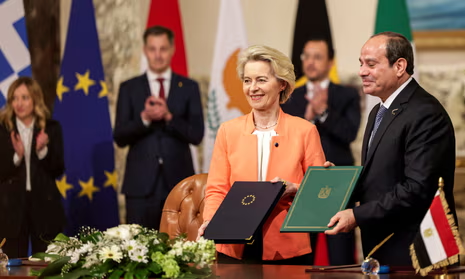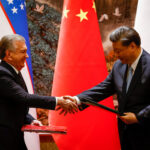Summary by Geopolist | Istanbul Center for Geopolitics
The article “The EU and Egypt: A Partnership with Limitations” examines the relationship between the European Union (EU) and Egypt, highlighting both the strategic benefits and the constraints of their partnership.
Key Points:
- Strategic Importance:
- Egypt is a significant partner for the EU due to its strategic location in the Middle East and North Africa (MENA) region. The country plays a crucial role in regional stability, migration management, and energy transit.
- Economic and Political Cooperation:
- The EU and Egypt have engaged in various forms of cooperation, including economic support, trade agreements, and investment initiatives. The EU has provided financial aid and technical assistance to support Egypt’s economic development and reforms.
- Human Rights Concerns:
- Despite the strategic benefits, the partnership faces limitations due to concerns over human rights and democratic governance in Egypt. The EU has criticized the Egyptian government’s record on political freedoms, human rights abuses, and suppression of dissent.
- Limited Impact:
- The EU’s influence on Egypt’s domestic policies is limited. While the EU has used its economic leverage to encourage reforms, the impact on actual policy changes has been modest. Egypt’s government has often prioritized its strategic and economic interests over the EU’s human rights concerns.
- Future Prospects:
- The partnership is likely to continue, driven by mutual interests in regional stability and economic collaboration. However, the limitations imposed by human rights issues and political disagreements will likely constrain the depth and effectiveness of their cooperation.
Overall, it highlights the complex nature of the EU-Egypt relationship, characterized by strategic alignment but constrained by significant political and human rights challenges. Read more below.
The EU and Egypt: A Partnership with Limitations
The relationship between Egypt and the EU took a big step forward in March 2024 with the signing of a strategic and comprehensive partnership agreement. For Europe, the deal was a sign of the importance that EU leaders attach to stability in Egypt at a time of conflict and strain in Egypt’s neighbourhood, as well as a recognition of the value that the EU sees in Egyptian cooperation on migration and other issues. For Egypt, the agreement provided both much-needed financial support and an endorsement of Egypt’s significance within its region. However, the enhanced relationship between the EU and Egypt does not mean that the two partners are closely aligned in all respects. Instead, it shows an acceptance by both sides that their interests require cooperation, but European officials also recognise limitations within the relationship, while Egypt is simultaneously pursuing partnerships with other regional and global powers.
Europe’s turn towards pragmatism
After Abdel Fattah el-Sisi seized power in Egypt in 2013, European cooperation with the country was initially scaled back. The EU’s Foreign Affairs Council issued critical conclusions in August 2013 following the violent dispersal of the Muslim Brotherhood protest camp in Rabaa Square, which led to hundreds of deaths. The EU’s political dialogue with Egypt, suspended after the revolution in 2011, remained frozen through 2015. However, following Sisi’s election as president in May 2014, a rapprochement between Europe and Egypt gradually began to take place. As hopes for the democratic uprisings of 2011 faded, European policy towards the Mediterranean became more pragmatic. The migration wave of 2015 and the spread of the Islamic State across the region led European policymakers to prioritise cooperation and stability in their relationships with Mediterranean partners.
Since 2015, engagement and support for Egypt’s stability have become the defining characteristics of European policy towards the country. Egypt’s growing population of over 113 million means that an economic collapse or significant internal conflict would have dramatic consequences, propelling large numbers of migrants towards Europe. Moreover, Egypt hosts large numbers of refugees from conflicts in nearby countries, including Syria, Yemen, Libya, and Sudan. European leaders thus regard Egypt as an effective partner in managing its coast and limiting irregular departures towards Europe.
Egypt is also an important economic partner for Europe, as evidenced for example by Egyptian arms purchases from France, major engineering contracts with German firms, and the role of Italy’s ENI energy company in developing the Zohr gas field off Egypt’s coast. The partnership priorities agreed between the EU and Egypt in 2022 place a lot of emphasis on support for Egypt’s sustainable economic development and its energy and digital transitions, which could benefit both Egypt and Europe. They also emphasize the importance of social development, recognising the high levels of poverty and unemployment in Egypt that have a devastating impact on the population’s standard of living. Finally, the partnership priorities emphasise Egypt’s important role as a partner in stabilising its region, which the EU also sought to recognise through holding the first EU-Arab League summit in Egypt in 2019.
The developments of the last two years have amplified European concerns about the importance of supporting Egypt in all these priority areas. The Russian invasion of Ukraine, coming on top of the lingering effect of the Covid-19 pandemic, has dramatically worsened Egypt’s economic situation, provoking a balance of payments crisis and a marked escalation in the prices of essential foodstuffs and other staple goods. The war in Gaza contributed to Egypt’s problems by causing a collapse of revenues from tourism and leading to a big drop in the number of ships passing through the Suez Canal, both of which provide significant shares of Egypt’s foreign exchange. The strategic partnership agreement showed the EU’s concern to support Egypt through the economic headwinds it was facing, particularly because of the role it has played in trying to broker an agreement to end Israel’s conflict with Hamas in Gaza, and also to recognise the value that the EU places on continuing cooperation on migration at a time of regional instability and uncertainty.
Limits on the relationship
Despite this commitment, European policymakers have reason to be concerned about some key aspects of Egypt’s trajectory. While the EU has committed to provide up to €5 billion in macro-financial assistance to Egypt over the next four years, it remains uncertain whether Egypt’s leadership is ready to push through the economic reforms that would be necessary to ensure that the funding provides more than a short-term fix. European support is designed to promote long-term stability and growth (and is dependent on successful reviews under a recently-expanded IMF loan agreement) but so far Sisi has shown little inclination to tackle some structural economic factors that inhibit private sector-led growth, including the outsize role of the army and regime-linked firms in the economy and a heavy state focus on non-tradeable sectors.
Moreover, the partnership agreement includes a commitment “to further promote democracy, fundamental freedoms, and human rights, gender equality and equal opportunities”. Although most European leaders have adopted a pragmatic approach to Egypt, they cannot ignore the continuing problems in the country’s governance and human rights record. European officials point to some steps that Egypt has taken in recent years to signal greater attention to human rights, including the publication of a national human rights strategy, the renewal of the country’s national council for human rights, and the release of some political prisoners. However, independent human rights organisations have portrayed these measures as largely cosmetic steps that do not address Egypt’s structural failings on human rights, including its failure to uphold the rights of freedom of expression and assembly, and the continuing arbitrary detention of large numbers of regime critics and activists. The steps that Egypt has taken to indicate that it is addressing the human rights concerns of its European partners show that its leadership cares about Egypt’s relationship with Europe. Sisi has consistently embraced opportunities to show how responsible a partner Egypt is for Europe, and to highlight the value that Europe attaches to Egypt’s role. Nevertheless, in the decade since he took power, Sisi has relied even more on financial support from Gulf Arab monarchies, particularly the UAE and Saudi Arabia. The $35 million deal that Egypt recently agreed with the UAE to develop the Ras El Hekma peninsula on Egypt’s Mediterranean coast dwarfs in scale the support that the EU has provided. Nevertheless, support from the Gulf is not cost-free; Gulf states have moved away from the unconditional financing that they provided in Sisi’s early years in power and are now looking to purchase assets rather than merely providing budget support. Under Sisi, Egypt has tried as far as possible to diversify its international relationships: China has been a significant partner in some of Sisi’s signature “mega-projects” such as the new administrative capital, while Russia is building Egypt’s first nuclear power plant. The EU remains an important source of investment and financing for Egypt, and the most plausible partner for economic modernisation, but its leverage is limited by the alternatives that Egypt can call on.
By: Anthony Dworkin
Source: ISPI







